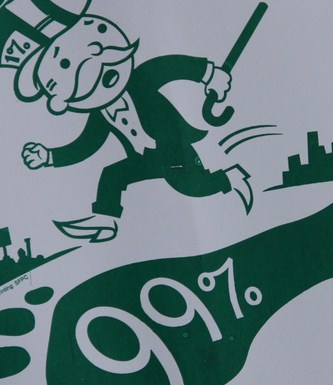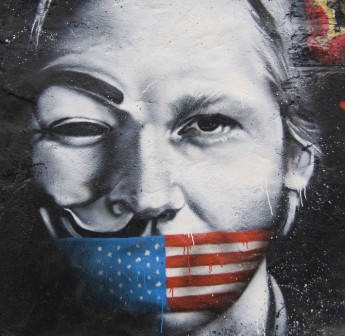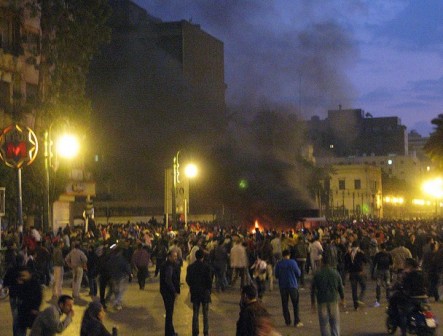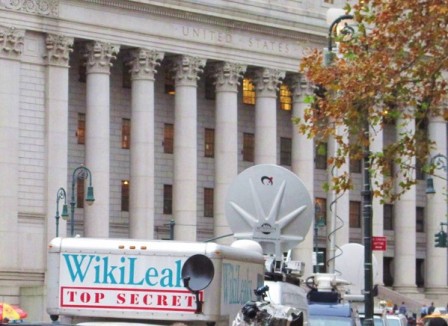Occupy and Anonymous: Challenging the World Order of Corporate Imperialism

NEWS JUNKIE POST
Dec 19, 2011 at 2:26 pm Some people are under the illusion that national borders still matter. If they do for the global 99 percent, borders have become completely obsolete for the 0.01 percent global corporate, governmental, and financial elite controlling world’s affairs. Currencies and products flow at lightning speed between all the markets. Today, a prince from Saudi Arabia, Alwaleed Bin Talal, announced a $ 300 million investment in the social media site Twitter, he is also in the process of starting his own TV network. The Saudis and the Chinese are buying farm land all over the world while Wall Mart will be opening stores in China.
Some people are under the illusion that national borders still matter. If they do for the global 99 percent, borders have become completely obsolete for the 0.01 percent global corporate, governmental, and financial elite controlling world’s affairs. Currencies and products flow at lightning speed between all the markets. Today, a prince from Saudi Arabia, Alwaleed Bin Talal, announced a $ 300 million investment in the social media site Twitter, he is also in the process of starting his own TV network. The Saudis and the Chinese are buying farm land all over the world while Wall Mart will be opening stores in China.
 Naturally, this world order of corporations has been made at the expense of the 99 percent. Companies take their manufacturing operations where ever labor is cheap and preferably not organized. The countries with strong unions end up losing countless good paying jobs while the work opportunities migrate to parts of the world where products can be manufactured for a small fraction of the cost. Anti-globalization activists have been aware of this for a long time, but until now, they have fought a losing battle. Some anti-globalization activists see national market protectionism as a solution. But it is unrealistic and shortsighted. In fact, it would make matters even more difficult for 99 percent of the world population. We are dealing with a global problem, and only a global strategy to fight the corporatist world order has a chance to succeed and, down the line, offer a worldwide solution.
Naturally, this world order of corporations has been made at the expense of the 99 percent. Companies take their manufacturing operations where ever labor is cheap and preferably not organized. The countries with strong unions end up losing countless good paying jobs while the work opportunities migrate to parts of the world where products can be manufactured for a small fraction of the cost. Anti-globalization activists have been aware of this for a long time, but until now, they have fought a losing battle. Some anti-globalization activists see national market protectionism as a solution. But it is unrealistic and shortsighted. In fact, it would make matters even more difficult for 99 percent of the world population. We are dealing with a global problem, and only a global strategy to fight the corporatist world order has a chance to succeed and, down the line, offer a worldwide solution.
 Chronologically, credit has to be given to Julian Assange’s Wikileaks for exposing the lies of countless governments and corporate entities. Wikileaks and their Anonymous allies, by shinning the bright light of truth on secrets and misinformation, lifted the veil on how a majority of people have been deceived by the powerful for decades. Without this global catharsis, made possible by the global information revolution, it is unlikely that the Arab revolution would have begun a year ago in Tunisia. But Wikileaks and Anonymous’ virtual cyber war on behalf of the truth and against our current world order of corporate imperialism had zero chance to succeed without a massive involvement of people in the real world.
Chronologically, credit has to be given to Julian Assange’s Wikileaks for exposing the lies of countless governments and corporate entities. Wikileaks and their Anonymous allies, by shinning the bright light of truth on secrets and misinformation, lifted the veil on how a majority of people have been deceived by the powerful for decades. Without this global catharsis, made possible by the global information revolution, it is unlikely that the Arab revolution would have begun a year ago in Tunisia. But Wikileaks and Anonymous’ virtual cyber war on behalf of the truth and against our current world order of corporate imperialism had zero chance to succeed without a massive involvement of people in the real world.
 Wikileaks seeded the revolutionary process on line, but the Arab Spring provided the guts and blood to make it grow by challenging dictatorial rulers and their military and police apparatus. While Egypt’s revolution is still a work in progress, it is undeniable that its global geopolitical impact has not only changed the complete Middle-East, but is also echoing everywhere else, including in the United States. Egyptian activists gave their support and spoke to the Occupy movement in the US when it started three months ago. Egyptian revolutionaries are fully aware that they have, by example, inspired the Occupy movement.
Wikileaks seeded the revolutionary process on line, but the Arab Spring provided the guts and blood to make it grow by challenging dictatorial rulers and their military and police apparatus. While Egypt’s revolution is still a work in progress, it is undeniable that its global geopolitical impact has not only changed the complete Middle-East, but is also echoing everywhere else, including in the United States. Egyptian activists gave their support and spoke to the Occupy movement in the US when it started three months ago. Egyptian revolutionaries are fully aware that they have, by example, inspired the Occupy movement.
 Now it is still a matter for the various branches-either local, regional or national- of the Occupy movement to connect the dots and coordinate specific actions. It is also an issue of defining a global platform of what could be a sustainable world governance by the 99 percent for the 99 percent. But Occupy and Anonymous activists should keep in mind that time is “of the essence” in this epic global fight ahead. The world order of corporate imperialism has military and police on its payroll, either private or public, and they will do whatever it takes to maintain the status quo. In the United States some new “legal” tools of repression in the form of the NDAA and SOPA are about to be implemented which would make America a de facto police state. This type of coercive legislation is likely to be copied elsewhere. This assault on civil liberties, basic human rights, and personal freedom which such legislation represents must be fought quickly, smartly and globally by the Occupy movement and their allies of Anonymous. The global 99 percent have the critical advantage of number, but they are outgunned by the mercenaries of the 0.01 percent.
Now it is still a matter for the various branches-either local, regional or national- of the Occupy movement to connect the dots and coordinate specific actions. It is also an issue of defining a global platform of what could be a sustainable world governance by the 99 percent for the 99 percent. But Occupy and Anonymous activists should keep in mind that time is “of the essence” in this epic global fight ahead. The world order of corporate imperialism has military and police on its payroll, either private or public, and they will do whatever it takes to maintain the status quo. In the United States some new “legal” tools of repression in the form of the NDAA and SOPA are about to be implemented which would make America a de facto police state. This type of coercive legislation is likely to be copied elsewhere. This assault on civil liberties, basic human rights, and personal freedom which such legislation represents must be fought quickly, smartly and globally by the Occupy movement and their allies of Anonymous. The global 99 percent have the critical advantage of number, but they are outgunned by the mercenaries of the 0.01 percent.
Related Articles
- November 23, 2012 Occupy Strategy: Global Strike and Consumer Boycott Should Be on the Agenda
- February 8, 2012 Will Occupy Choose Super-PAC Funding Over Radical Action?
- June 16, 2012 Will Occupy Radicalize and Globalize or Fizzle out and Die?
- December 3, 2011 My Thoughts on Occupy
- January 29, 2012 Has Occupy Forgotten Why?
- December 15, 2011 Occupy and The Mayan Calendar: Will 2012 Be the Year of a Global Revolution?












You must be logged in to post a comment Login